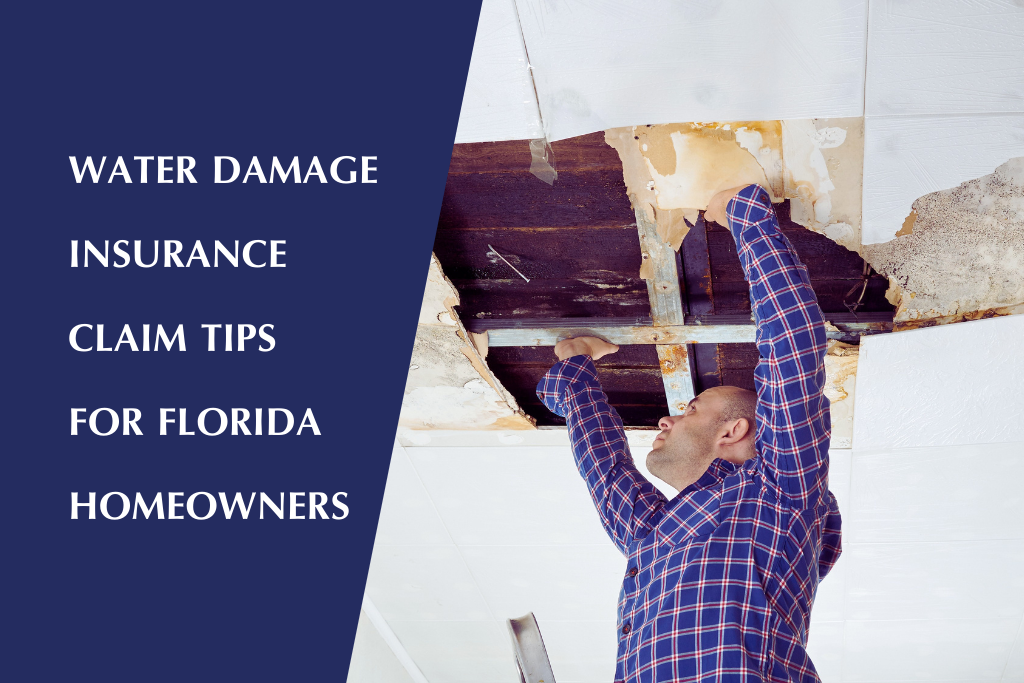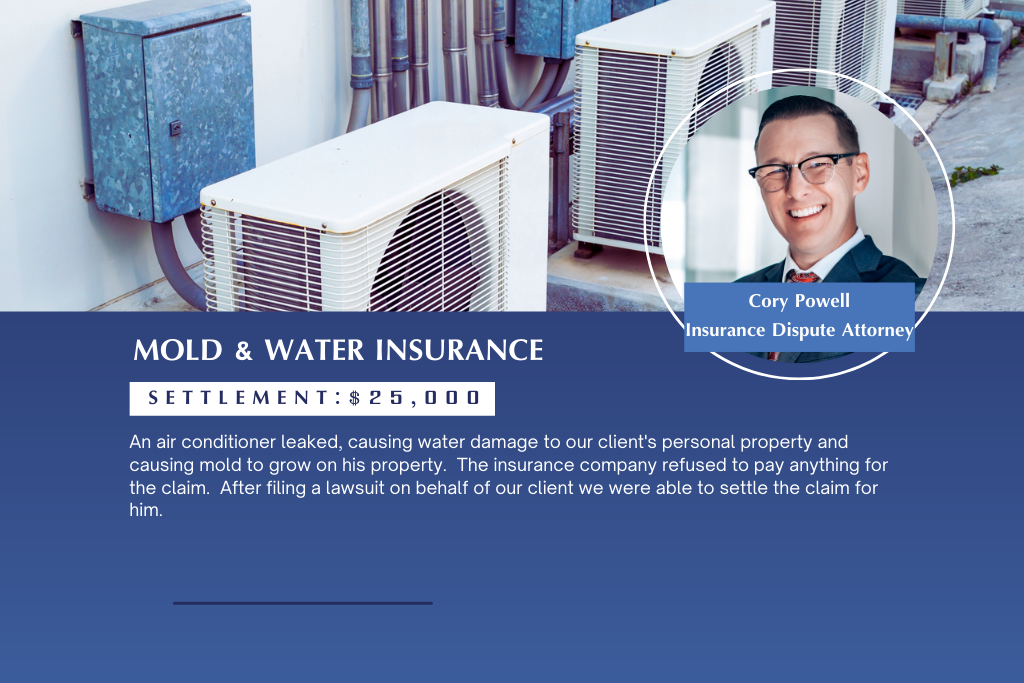Water damage is one of the most common causes of home insurance claims. For homeowners, unexpected water damage can be inconvenient and downright devastating. But knowing what to do immediately after your home experiences water damage can help you be better prepared. Read on to learn different types of water damage, what kind of water damage is covered under your insurance, and how to make a successful water damage insurance claim.

The Cliff Notes: Key Takeaways From This Post
We supplied tips for water damage insurance claims process in Florida; however, here are the key bullet points if you are in a rush:
- Water damage claims must meet requirements of standard home insurance policies, such as needing to be sudden or internal with no ground contact.
- Homeowners should know three types of water damage commonly covered: sewer/water backup, overflow and discharge, and flood.
- Gradual damage from things like seepage, lack of repair, and poor repairs typically won’t qualify for coverage.
- Before filing a claim, homeowners need to document the damage with photos/videos and keep any damaged items as evidence.
- Understanding your policy’s declarations page is essential prior to filing; you’ll receive Homeowner’s Bill of Rights brochure upon filing the claim in Florida.
- An adjuster will inspect the property after the claim is filed; written estimates should be provided to the insurance company at each stage of the process.
- If an insurance claim is approved, a settlement will be issued. If denied, a second opinion may help or an insurance dispute attorney can assist in recovering benefits entitled by law.
Why the Type of Water Damage Present will Impact Your Insurance Claim
Standard insurance policies require water damage to be a sudden or internal occurrence, with the requirement that the water has never touched the outside ground. For instance, an insurance policy may accept your claim for water damage if:
- There is a discharge or overflow of water, even if it was an accident
- Damage caused by the weight of ice, snow, or sleet.
- Freezing of plumbing pipes
- Tearing apart, cracking, burning, or bulging of steam
It’s important to note that some homeowners opt for a cheaper insurance policy such as an HO-1. In these type of policies, a homeowner may have limited coverage unlike other standard policies.
For better understanding, let’s take a look at 3 types of water damage in home insurance to help guide you as you’re making your insurance claim.
Sewer or Water Backup Coverage
A sewer backup happens when water comes up into your home. It can also be due to water being pushed into your home through the pipes from your sewer or drainage system. There are many things that can lead to a backup such as a tree root intrusion, blockage of city sanitary main, a city-related pipeline issue, or simply aging pipes.
Overflow Water Damage and Discharge Water Damage
Another type of water damage that’s usually covered under standard insurance policies is sudden and accidental discharge or overflow from plumbing fixtures or appliances. An overflow involves water escaping or overflowing from appliances, pipes, or water outlets inside the home.
Discharge, on the other hand, is when water is released from plumbing or appliances and then floods your home.
Flood Water Damage
A flood happens when a body of water is overflowing to the point where the level of water outside your home rises to the point it enters your home. If more than one area of your home is flooded, this is a good sign you have a flood claim. However, if your home is the only home affected, this decreases the likelihood of it being a flood claim.
What About Gradual Damage?
Your home is a complex structure. Therefore, you may not know exactly what’s going on behind the walls, but water damage can occur, even without an apparent situation. In fact, homeowners usually don’t know they have water damage until there is physical structural damage. With that said, if the damage is not sudden or accidental, and is instead a long-standing problem that was never addressed, this claim will likely get denied.
For instance, if you have plumbing, faucets, or pipes that leak over time and damage the walls as a result, this will likely be denied by the insurance company. Along with this, water damage caused by seepage from things like cracks in the foundation or at the exterior will not be a valid claim.
Other things such as mold, corrosion, deterioration of electrical wiring, poor repairs, or lack of home repairs will all likely be denied.
For homeowners who are preparing to file an insurance claim, it’s important to keep this in mind. Most insurance policies are very specific about what they will and will not accept as a valid water damage insurance claim. Knowing your policy, as well as, what kind of water damage your home has is the first step to filing a successful water damage insurance claim.

What Florida Homeowners Should Know Before Filing a Water Damage Insurance Claim
Before filing a water damage insurance claim, it’s important for homeowners to take a few measures. For starters, turn off the water source that caused the damage, if applicable. Take any valuables and move them to a safe area. After this, homeowners should board up doors or windows to prevent further damage. If the conditions are safe, homeowners should remove any standing water and dry the affected area as much as possible. However, keep in mind that it’s best to let a skilled company board up and remove water if the damage is extensive. Lastly, document the damage using a camera or video.
It’s important to note that you should never throw away any items that were damaged by the water. These items are used as evidence in your insurance claim. Throwing away these items might cause you not to get compensated for the damage.
In addition to this, never make repairs before approval. Your insurance company will make note of what repairs need to be completed during the inspection. If you perform the repairs beforehand, you run the risk of not being compensated.
Filing a Water Damage Insurance Claim in Florida
- The first thing that homeowners should do is review their homeowner’s insurance policy. Your agent will be able to provide you with a copy of your original policy if it is missing or damaged. Be sure to review the declarations page as this will have important information regarding your policy’s water damage coverage.
- You’ll also receive the Homeowner’s Bill of Rights brochure after you file the claim with your insurance provider in Florida
- Be sure that you take extensive photos/videos of the damage before cleanup begins. These photos are a vital component of getting your claim approved.
- After inspecting the scene, homeowners should work with a company that specializes in things like damage assessment, cleanup estimates, and restoration. This not only gives homeowners a good idea of the cost of repairs but the company can also perform water extraction and drying services. In addition, the company should be able to properly board up your home and perform mold remediation as needed.
- Be sure to get written estimates from the company at each stage of the process as well. These estimates will need to be provided to the insurance company.
- Also, be prepared to gather the information that is essential to your insurance claim. Your insurance company will want to know details such as when and where the water damage happened, the contact information of the property owner, the cleanup and remediation estimates, any receipts pertaining to clean up, repairs, and other related costs, and a complete list of damaged items and materials.
- Aside from this, it’s best practice to keep a record of everyone you’ve talked to throughout the insurance claim process. Document the date and time of the call, along with the name of the representative. It’s also good to write down a brief description of the conversation.
What Happens After Filing an Insurance Claim in Florida?
Once you’ve filed your insurance claim, your insurance company will send out an adjuster to inspect your property. They will review the damage and ask you questions pertaining to the damage and the condition of the home beforehand. It’s a good idea to share the estimates you’ve gathered with the adjuster to ensure you get a fair settlement.
After the adjuster submits a report on the claim to your insurance company, the insurance company may issue a settlement. The settlement is the amount of money that the insurance company agrees to give you in order to fix or replace your damaged property.
The time it takes to receive a settlement will vary. However, it will depend on things such as the extent of the damage, the time it takes to send an adjuster out to your property, and whether you and your insurance company can come to an agreement in regard to the appropriate amount you should be compensated for the damages.
It’s important to note that your state law may set timelines for an insurance company to follow through with the claim process. Check with your state insurance department or commissioner for more information.
When Your Water Damage Insurance Claim Gets Approved
If your insurance claim was approved, congratulations. This means that you and your insurance company have come to an agreement, and they are willing to compensate you for the damage. When your insurance company approves your claim, they will send you a list of vendors that they work with. While this list can be good, don’t be tempted to choose the first person on the list. Instead, conduct research and get a few quotes from experienced contractors. The goal is to find someone who is skilled and reliable for the job. Your home has already suffered enough, you don’t want to create any additional problems.
When Your Water Damage Insurance Claim Gets Denied
Unfortunately, insurance companies don’t always approve water damage insurance claims. If your insurance company denied your claim, there’s a good chance your policy didn’t cover the damage to your home. This could be because you denied the coverage when you first purchased the policy or it wasn’t offered to you.
The insurance company may also deny a claim if they have reason to believe you failed to practice regular maintenance, which led to the water damage. However, if you believe you’ve properly maintained your home, it’s a good idea to get a second opinion as some insurance companies prefer to not pay out.
Water Damage Claim Denied? Contact an Insurance Dispute Attorney in Florida
At Herman & Wells, we are dedicated to helping homeowners with their home insurance claims. If you believe your water damage claim was wrongfully denied or you haven’t been compensated fairly, we offer free case evaluations.
We’ll review your denial claim and help you determine the issue. Our expert insurance attorney will help homeowners recover insurance benefits they’re entitled to at no cost, unless you win. Contact us today to learn more.

